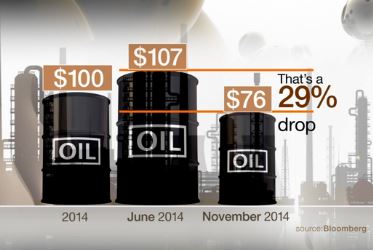- Details
Solar's big heyday may be just three years away as the unsubsidized cost of panels plus storage is set to become cheaper than retail power supply in several large markets, Bernstein said.
"The math would work in: Australia, Japan and Spain. Brazil and parts of California will become economic shortly thereafter," Bernstein said in a note last week. "At that point, solar without subsidy and without kid-glove regulatory treatment, would - if combined with energy storage solutions - be capable of supplying electricity ('on' and 'off')."
It expects solar will reach a cost below $0.40 a watt by 2018, leading to a combined cost of the solar-plus-battery electricity supply of $0.24 a kilowatt hour on an unsubsidized basis in select markets, including Australia, where residential retail power averages $0.26 a kilowatt hour.
- Details
This is the beginning of the end.
The race for renewable energy has passed a turning point. The world is now adding more capacity for renewable power each year than coal, natural gas, and oil combined. And there's no going back.
The shift occurred in 2013, when the world added 143 gigawatts of renewable electricity capacity, compared with 141 gigawatts in new plants that burn fossil fuels, according to an analysis presented Tuesday at the Bloomberg New Energy Finance annual summit in New York. The shift will continue to accelerate, and by 2030 more than four times as much renewable capacity will be added.
"The electricity system is shifting to clean,'' Michael Liebreich, founder of BNEF, said in his keynote address. "Despite the change in oil and gas prices there is going to be a substantial buildout of renewable energy that is likely to be an order of magnitude larger than the buildout of coal and gas."
- Details
 World Bank will only fund coal projects in cases of 'extreme need' due to the risk climate change poses to ending world poverty, says Jim Yong Kim
World Bank will only fund coal projects in cases of 'extreme need' due to the risk climate change poses to ending world poverty, says Jim Yong Kim
The World Bank will invest heavily in clean energy and only fund coal projects in "circumstances of extreme need" because climate change will undermine efforts to eliminate extreme poverty, says its president Jim Yong Kim.
- Details
 Why has the price of oil been so volatile?
Why has the price of oil been so volatile?
Oil prices have dropped 29% since June 2014. This short video from the BBC explains why;
- Details
 Natural gas is often touted as a “bridge” fuel to reduce greenhouse-gas emissions during a transition from coal-fired power plants to renewable sources of energy. But natural gas offers few short-term benefits over coal, according to a study released last week by Energy Innovation, as long as the natural-gas infrastructure continues to leak methane.
Natural gas is often touted as a “bridge” fuel to reduce greenhouse-gas emissions during a transition from coal-fired power plants to renewable sources of energy. But natural gas offers few short-term benefits over coal, according to a study released last week by Energy Innovation, as long as the natural-gas infrastructure continues to leak methane.
© 2018 Greenrock Bermuda | All Rights Reserved | Web Design & Development

